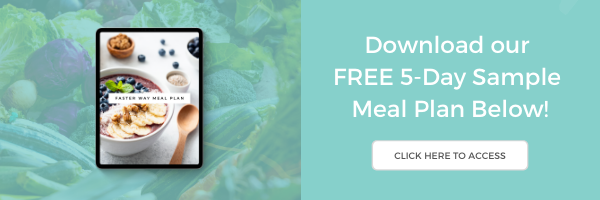
Some of the most popular diets consist of eliminating an entire macronutrient, but we believe there’s a better way than extreme deprivation, and it starts with whole foods.
We invited Kareen Turner, RD to join us on the FASTer Way Podcast to talk about whole foods and living a plant-based lifestyle. Listen to the full episode here!
What are macronutrients?
There are 3 macronutrients (or macros for short) that make up our food. They are carbohydrates, fat, and protein. Each one serves a different role in the body and each one is important for good health! (You can learn more about macros here.
Why do we need protein?
Protein fuels our systems and our muscles! It helps build hair, collagen, nails, and even our internal systems. Most people think of meat when they think of protein, but vegans can get plenty of protein every day, too!
Good plant-based sources of protein include:
Lentils
Tofu
Edamame
Chickpeas
Quinoa
Legumes
Nuts
Why are carbs important?
Carbs are the body’s preferred source of energy—we are built to run on carbs! But our bodies are adaptable (we want to survive!) so if you eat a high-protein or high-fat diet, your body will figure out how to use them for energy—but it’s not optimal.
We need carbs for energy, but we need to eat the right kind. Carbs generally get a bad rap because we often think of junk food when we think of carbs (donuts, chips, fries, etc.). Instead, think of high-carb whole foods to meet your macronutrient goals. Some great choices include:
Quinoa
Oats
Buckwheat
Bananas
Sweet potatoes
Oranges
Blueberries
Beans
Millet
Couscous
The list could go on and on because carbs are plentiful in plant foods!
So what about low carb diets?
Low carb diets like keto are really popular because they do tend to get results—at least at first. One of the most significant problems, though, is that people on a ketogenic diet are under-consuming fruits and veggies, which means they’re low in micronutrients.
“Any diet that has you restricting fruits and vegetables is one to avoid.”
-Kareen Turner, RD
Sure, you *could* take a supplement to try to make up for the missing nutrition in your diet, but it’s just not the same as getting your micronutrients from wholesome foods.
We’ve said it before, a keto diet can benefit certain people at certain times, but it simply isn’t a great long-term strategy. There are certain medical reasons to look into keto for a while (like type 2 diabetes), and the good news is, the FASTer Way is a great tool to transition back to carbs.

The skinny on FAT
Before we go any further, let’s bust a favorite myth in the fitness industry. Friends, eating fat does NOT make you fat! In fact, if you look at the trend of rising obesity rates, everything shot through the roof when we went low fat in the 1980s. Our bodies NEED fat because fat is essential for cell growth, proper absorption of some nutrients, producing hormones, keeping us satiated, and more.
It’s time to stop being afraid of fat—so let’s learn which fats are best for us to consume! At the FASTer Way to Fat Loss, we encourage healthy fats with food choices like:
Avocado
Coconut oil
Nut butter
Olives
The most successful “diet” isn’t low carb, low fat, or any other kind of extreme. It’s balanced macros with a focus on nutrient-dense whole foods. When you join a program like the FASTer Way to Fat Loss, we’ll teach you how to set your macros (because there is no one-size-fits-all answer) and we’ll make sure you build a solid foundation for a truly healthy lifestyle.
A note about macros
Macronutrient goals will need to be adjusted at some point. It’s really not a question of if, it’s a question of when and how. As you fuel your body properly, your metabolism will need MORE energy (not less!) in order to continue seeing progress
Think of it this way. We’re starting a fire in the first 6 weeks of the FASTer Way. If you want that fire to get bigger, you have to add more wood, not take it away. Our bodies are the same, we need more fuel to keep seeing results!
Thanks to Kareen for joining us and sharing so much incredible wisdom! We’re excited to hear more from her in upcoming episodes and can’t wait to see what great topics we’ll hear about next! You can connect with Kareen on Instagram @KareenVTurner
Learn more about carb cycling:

* This article was originally published here
No comments:
Post a Comment